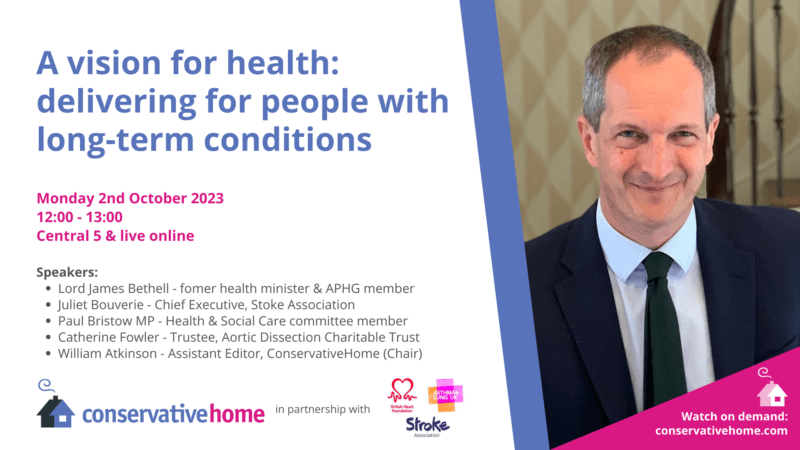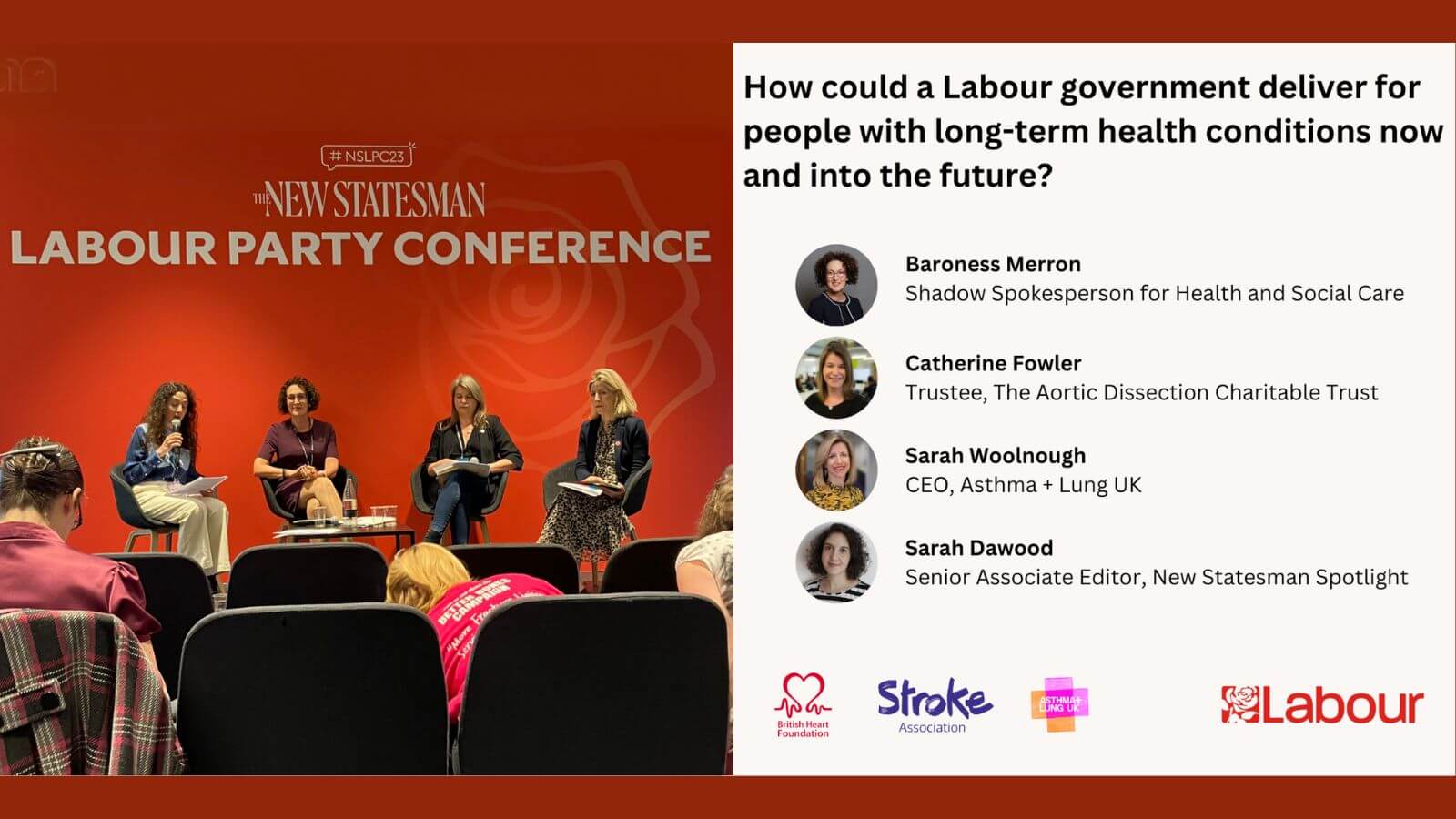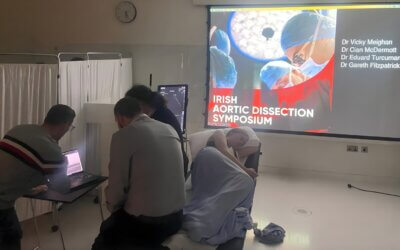In a bid to further the advocacy for aortic dissection patients and their families, our Trustee Catherine Fowler represented the Aortic Dissection Charitable Trust at two major political venues – the Conservative Party Conference and Labour Party Conference. Both events had the shared objective of improving healthcare for individuals with long-term health conditions.
“While innovation holds promise, it’s crucial we focus on existing principles and guidelines to drive change. Our advocacy for the acute aortic dissection toolkit, co-created with clinicians and patients, is a step towards early identification and management of this condition.”
Conservative Party Conference
At the Conservative Party Conference 2023, the Charity was part of a fringe event titled “A Vision for Health: Delivering for People with Long-Term Health Conditions”. Catherine shared the panel with Lord James Bethell, Juliet Bouverie, and Paul Bristow MP. The agenda covered a broad spectrum of issues focused on long-term health conditions like aortic dissection.
Catherine discussed the Trust’s progressive work in developing and implementing personalised treatment plans, emphasising the importance of consistent follow-up and care. She also highlighted the potential of integrating mobile and advanced monitoring systems for healthcare professionals, which could significantly enhance patient care and monitoring.
A significant part of the discussion was aimed at increasing public awareness and advocating for policy changes to better support individuals living with cardiovascular conditions. The insights and discussions among the panellists were geared towards driving meaningful change in healthcare policies and practices.

Labour Party Conference
The Labour Party Conference presented another platform for advocacy, hosted by the New Statesman, titled “How Could a Labour Government Deliver for People with Long-Term Health Conditions Now and Into the Future?”. Catherine, alongside Baroness Merron, Shadow Spokesperson for Health and Social Care, and Sarah Woolnough CEO, Asthma + Lung UK, contributed to a conversation aimed at identifying strategies and policies to improve healthcare under a potential Labour government.
The discussion led to addressing the importance of enhancing accessibility and inclusivity in medical research. Catherine’s insights, drawn from advocacy and lived experiences, added to the discussion by offering a patient-centric viewpoint, stressing the need for a healthcare landscape that caters to the diverse needs of the population.
The conversation revolved around identifying practical steps and strategies to create a situation where every individual’s medical experiences and needs are acknowledged, leading to more equitable healthcare outcomes and personalised treatment approaches.

Photo credit: Duleep Allirajah, CEO, The Richmond Group
The Charity’s Vision Through Systemic, Policy-Driven, and Collaborative Solutions
Addressing Long-term Health Conditions
The Charity sees a plethora of opportunities such as proactive identification and management of at-risk individuals, improving treatment access, follow-up, rehabilitation, and patient education. The charity stresses the necessity of national standards and service specifications, and also the empowerment of local leadership for solution implementation. By reorganising existing pathways, like the acute toolkit, better outcomes can be achieved without incurring high costs.
Health Inequalities
Health disparities are evident as patients with higher deprivation indices have lower treatment rates for AD. The accessibility issues, especially to tertiary centres, exacerbate these disparities. The charity suggests digital communication and improved resources for general practice as potential solutions.
Policy Measures for Improved Quality of Life
The charity advocates for proactive care through service specifications, national guidance, localised pathway development, and consistent data capture for policy evaluation. Effective policy implementation, exemplified by the AAD toolkit, can be facilitated through regional leads and program managers coordinating with a central national team.
Role of Innovation and Technology
While recognising the potential of innovation, the charity emphasises the importance of addressing current basic infrastructural challenges, such as the simple transfer of CT scans between hospitals, to save lives and improve outcomes.
Investing in Data Collection for Evidence-based Policies
Transitioning to the more specific International Classification of Diseases 11th edition and investing in data collection and analysis can offer a rich source for pathway design and policy formulation, although current resource and funding constraints need addressing.
Economic Implications of Long-term Conditions
Using AD as an example, the charity highlights the profound economic and personal impacts on individuals and their families. Investment in specialist nurses could significantly improve rehabilitation and support, enabling many to return to work and contribute to the economy.
Progress Post NHS Long-term Plans
The acute AD toolkit is highlighted as a positive step, with its flexible framework allowing for regional adaptation. Its development, driven by extensive engagement from patients and families, showcases a constructive approach to managing long-term conditions.
Workforce Recruitment and Retention
The charity underscores the value of specialist nurses in providing holistic care and serving as educational resources. It also proposes broader collaboration with charities and patient groups to enhance patient-centred care and empower individuals in managing their conditions.
Catherine Fowler says implementation is the most important factor for the NHS Long-Term Plan and the Government’s Major Conditions Strategy.
— BHF Policy (@BHFpolicy) October 10, 2023
“Policy needs to meet local needs.”
Shaping a Better Healthcare Future through Robust Dialogues and Engagements
The participation in both conferences illustrates a strong commitment towards fostering a robust dialogue around healthcare reforms. It also showcases the importance of bipartisan engagement in driving healthcare policies that are inclusive and beneficial to all, especially those living with long-term health conditions like aortic dissection. Through these engagements, TADCT continues to play a significant role in shaping a better healthcare future.
Thank you to the British Heart Foundation for inviting us to represent the Patient and Public Voice at these national discussions. Their recognition of the Aortic Dissection Charitable Trust’s role in voicing the concerns and experiences of individuals with long-term health conditions is much appreciated. The stark reality that individuals with long-term health conditions constitute 70% of NHS spend underscores the magnitude and urgency of the required actions.
Our collaboration with major organisations like the British Heart Foundation amplifies the advocacy for better healthcare provisions and policies. Together, we aim to navigate the policy landscape to foster a more accommodating and supportive healthcare environment for all.




